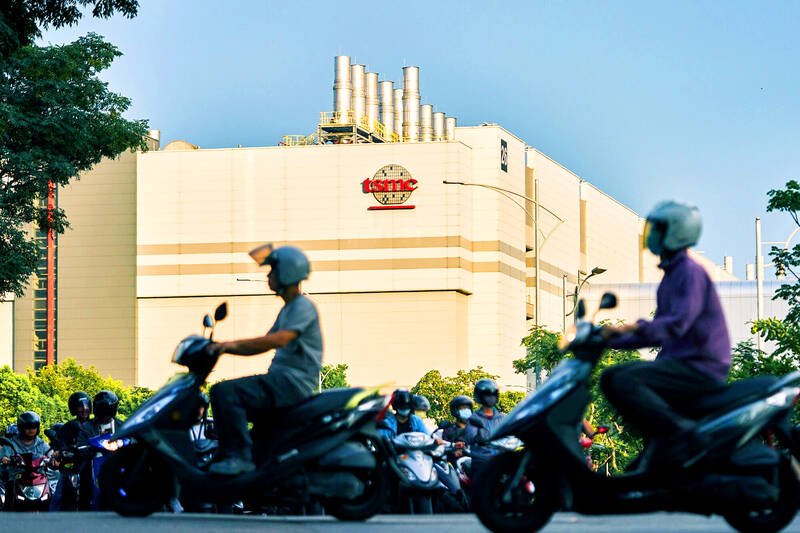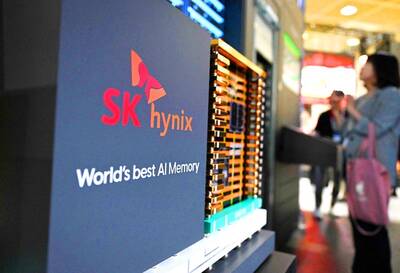Taiwan Semiconductor Manufacturing Co’s (TSMC, 台積電) revenue rose 45 percent last month, accelerating its pace of growth from the second quarter and bolstering hopes for sustained strong demand for artificial intelligence (AI) chips from the likes of Nvidia Corp.
Sales for the month reached NT$256.95 billion (US$7.92 billion). For the third quarter, analysts project TSMC revenue should grow 37 percent to NT$747.4 billion, with last month’s result suggesting TSMC could surpass those expectations.
Taiwan’s biggest company is one of the key bellwethers for AI demand, as the go-to chipmaker for leading accelerator makers Nvidia and Advanced Micro Devices Inc. It is also the sole supplier of processors for Apple Inc’s iPhones, at a time the mobile device market is showing signs of bouncing off post-COVID-19 lows.

Photo: An Rong Xu, Bloomberg
The world’s largest contract chipmaker last month raised its full-year growth outlook to beyond the maximum mid-20 percent it had guided toward previously.
TSMC offered an upbeat assessment of its business and prospects when it last reported earnings, with chief executive officer C.C. Wei (魏哲家) signaling the company might have room to raise prices as more of its customers transition to its most advanced technology and have to compete for limited capacity.
High-performance computing, led by AI, contributed 52 percent of TSMC’s revenue last quarter, the first time it has accounted for more than half.
However, investors have started to question whether the billions of dollars big tech firms have invested in the infrastructure to support the AI boom would result in substantial returns, while a potential delay in Nvidia’s development of a new generation of AI chips is spurring concerns over the progress of the emerging technology.
Worries about the global economic outlook over the past week interrupted the AI rally that had seen key players such as TSMC gains billions in market value. Investors opted to cash out of some of the year’s biggest gainers, pushing TSMC’s shares down 10 percent in a day, although they recovered much of that in subsequent days as money managers saw a good buying opportunity.

Intel Corp chief executive officer Lip-Bu Tan (陳立武) is expected to meet with Taiwanese suppliers next month in conjunction with the opening of the Computex Taipei trade show, supply chain sources said on Monday. The visit, the first for Tan to Taiwan since assuming his new post last month, would be aimed at enhancing Intel’s ties with suppliers in Taiwan as he attempts to help turn around the struggling US chipmaker, the sources said. Tan is to hold a banquet to celebrate Intel’s 40-year presence in Taiwan before Computex opens on May 20 and invite dozens of Taiwanese suppliers to exchange views

Application-specific integrated circuit designer Faraday Technology Corp (智原) yesterday said that although revenue this quarter would decline 30 percent from last quarter, it retained its full-year forecast of revenue growth of 100 percent. The company attributed the quarterly drop to a slowdown in customers’ production of chips using Faraday’s advanced packaging technology. The company is still confident about its revenue growth this year, given its strong “design-win” — or the projects it won to help customers design their chips, Faraday president Steve Wang (王國雍) told an online earnings conference. “The design-win this year is better than we expected. We believe we will win

Power supply and electronic components maker Delta Electronics Inc (台達電) yesterday said it plans to ship its new 1 megawatt charging systems for electric trucks and buses in the first half of next year at the earliest. The new charging piles, which deliver up to 1 megawatt of charging power, are designed for heavy-duty electric vehicles, and support a maximum current of 1,500 amperes and output of 1,250 volts, Delta said in a news release. “If everything goes smoothly, we could begin shipping those new charging systems as early as in the first half of next year,” a company official said. The new

SK Hynix Inc warned of increased volatility in the second half of this year despite resilient demand for artificial intelligence (AI) memory chips from big tech providers, reflecting the uncertainty surrounding US tariffs. The company reported a better-than-projected 158 percent jump in March-quarter operating income, propelled in part by stockpiling ahead of US President Donald Trump’s tariffs. SK Hynix stuck with a forecast for a doubling in demand for the high-bandwidth memory (HBM) essential to Nvidia Corp’s AI accelerators, which in turn drive giant data centers built by the likes of Microsoft Corp and Amazon.com Inc. That SK Hynix is maintaining its